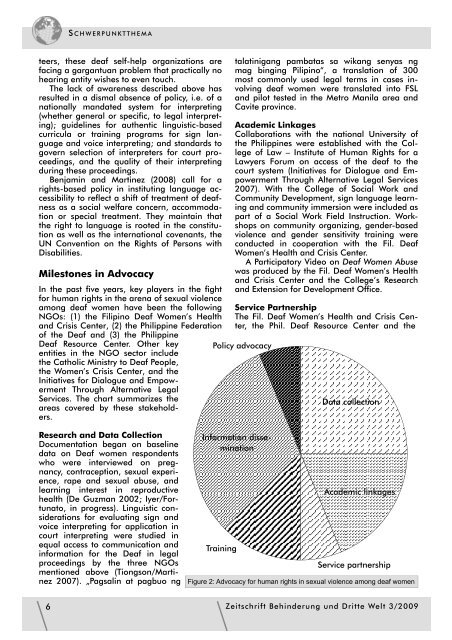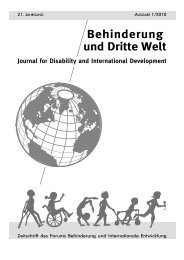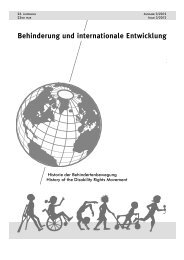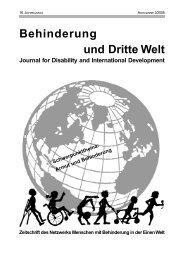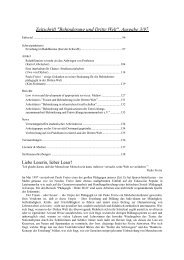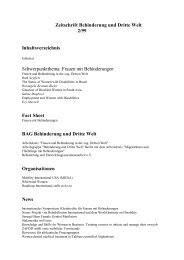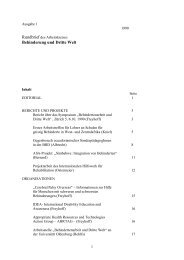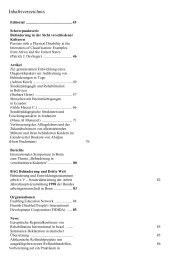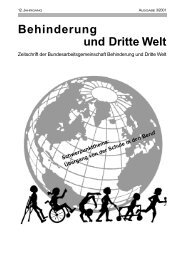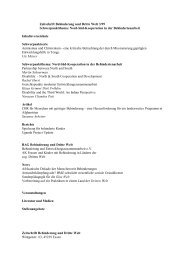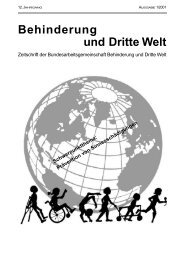Zeitschrift Behinderung und Dritte Welt
Zeitschrift Behinderung und Dritte Welt
Zeitschrift Behinderung und Dritte Welt
Create successful ePaper yourself
Turn your PDF publications into a flip-book with our unique Google optimized e-Paper software.
S CHWERPUNKTTHEMAteers, these deaf self-help organizations arefacing a gargantuan problem that practically nohearing entity wishes to even touch.The lack of awareness described above hasresulted in a dismal absence of policy, i.e. of anationally mandated system for interpreting(whether general or specific, to legal interpreting);guidelines for authentic linguistic-basedcurricula or training programs for sign languageand voice interpreting; and standards togovern selection of interpreters for court proceedings,and the quality of their interpretingduring these proceedings.Benjamin and Martinez (2008) call for arights-based policy in instituting language accessibilityto reflect a shift of treatment of deafnessas a social welfare concern, accommodationor special treatment. They maintain thatthe right to language is rooted in the constitutionas well as the international covenants, theUN Convention on the Rights of Persons withDisabilities.Milestones in AdvocacyIn the past five years, key players in the fightfor human rights in the arena of sexual violenceamong deaf women have been the followingNGOs: (1) the Filipino Deaf Women’s Healthand Crisis Center, (2) the Philippine Federationof the Deaf and (3) the PhilippineDeaf Resource Center. Other keyentities in the NGO sector includethe Catholic Ministry to Deaf People,the Women’s Crisis Center, and theInitiatives for Dialogue and EmpowermentThrough Alternative LegalServices. The chart summarizes theareas covered by these stakeholders.talatinigang pambatas sa wikang senyas ngmag binging Pilipino“, a translation of 300most commonly used legal terms in cases involvingdeaf women were translated into FSLand pilot tested in the Metro Manila area andCavite province.Academic LinkagesCollaborations with the national University ofthe Philippines were established with the Collegeof Law – Institute of Human Rights for aLawyers Forum on access of the deaf to thecourt system (Initiatives for Dialogue and EmpowermentThrough Alternative Legal Services2007). With the College of Social Work andCommunity Development, sign language learningand community immersion were included aspart of a Social Work Field Instruction. Workshopson community organizing, gender-basedviolence and gender sensitivity training wereconducted in cooperation with the Fil. DeafWomen’s Health and Crisis Center.A Participatory Video on Deaf Women Abusewas produced by the Fil. Deaf Women’s Healthand Crisis Center and the College’s Researchand Extension for Development Office.Service PartnershipThe Fil. Deaf Women’s Health and Crisis Center,the Phil. Deaf Resource Center and thePolicy advocacyData collectionResearch and Data CollectionDocumentation began on baselinedata on Deaf women respondentswho were interviewed on pregnancy,contraception, sexual experience,rape and sexual abuse, andlearning interest in reproductivehealth (De Guzman 2002; Iyer/Fortunato,in progress). Linguistic considerationsfor evaluating sign andvoice interpreting for application incourt interpreting were studied inequal access to communication andinformation for the Deaf in legalproceedings by the three NGOsmentioned above (Tiongson/Martinez2007). „Pagsalin at pagbuo ngInformation disseminationTrainingAcademic linkagesService partnershipFigure 2: Advocacy for human rights in sexual violence among deaf women6 <strong>Zeitschrift</strong> <strong>Behinderung</strong> <strong>und</strong> <strong>Dritte</strong> <strong>Welt</strong> 3/2009


